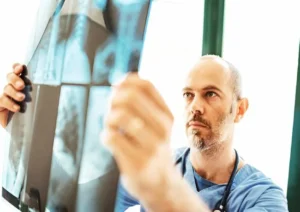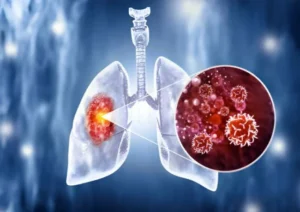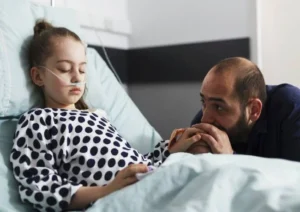Understanding Lung Cancer:
Causes Symptoms and Treatment Options
Intro to Lung Cancer
Lung cancer is one of the most common and serious cancers out there affecting millions globally.
It starts when abnormal cells grow out of control in the lungs creating tumors that can mess with how your lungs work.
Spotting it early and getting treated is key to upping the chances of survival.
In this guide we’ll dive into the causes symptoms diagnosis and treatment options for lung cancer.
Whether you’re a patient caregiver or just looking to learn more this post has got some useful insights.
What Is Lung Cancer?
Lung cancer starts in the lungs and can spread to other parts of the body. There are two main types:
1. Non-Small Cell Lung Cancer (NSCLC)

This is the most common type making up about 85% of cases. It includes subtypes like:
- Adenocarcinoma
- Squamous cell carcinoma
- Large cell carcinoma
2. Small Cell Lung Cancer (SCLC)
This aggressive type grows and spreads fast accounting for about 10-15% of cases. It’s strongly linked to smoking.
Causes and Risk Factors of Lung Cancer
There are several factors that can boost the chances of getting lung cancer:
1. Smoking
- Main cause of lung cancer
- Responsible for about 85% of cases
- Secondhand smoke also raises the risk
2. Exposure to Radon Gas
- A major cause among non-smokers
- It’s an odorless and colorless gas often found in homes
3. Occupational Hazards
- Stuff like asbestos arsenic and diesel fumes
- Workers in construction and mining face higher risks
4. Air Pollution
- Long-term exposure to bad air
- Slightly increases the risk of lung cancer
5. Family History and Genetics
- Some inherited gene changes might play a part.
Symptoms of Lung Cancer
In the early stages lung cancer can have no symptoms at all but as it progresses you might notice:
Common Symptoms
- Persistent cough
- Chest pain
- Shortness of breath
- Coughing up blood
Advanced Symptoms
- Unexplained weight loss
- Fatigue
- Bone pain
- Headaches if it spreads to the brain
Diagnosis and Screening

Catching it early can really help. Here’s how doctors diagnose lung cancer:
1. Imaging Tests
- X-rays – the first step in screening
- CT Scans – provide more detailed images
- PET Scans – show if cancer has spread
2. Biopsy
- A tissue sample checked for cancer cells
- Methods include needle biopsy and bronchoscopy
3. Sputum Cytology
- This checks your mucus for cancer cells.
Who Should Get Screened?
- Smokers aged 50-80
- People with a 20-pack-year smoking history
Treatment Options for Lung Cancer
What treatment you get depends on the type and stage of cancer as well as a person’s health.
1. Surgery
- Removes tumors especially in early-stage NSCLC
- Types include lobectomy and pneumonectomy
2. Radiation Therapy
- Uses strong beams to kill cancer cells
- If surgery isn’t an option this is often used
3. Chemotherapy
- Uses drugs to destroy cancer cells
- Common for SCLC and advanced NSCLC
4. Targeted Therapy
- Focuses on specific genetic changes
- Drugs like Osimertinib for EGFR mutations
5. Immunotherapy
- Helps boost the immune system to fight cancer
- Common options include Keytruda and Opdivo
Prevention and Early Detection

You can lower your risks with some lifestyle tweaks:
1. Quit Smoking
- This is the best way to prevent lung cancer
- Look for help from programs to quit smoking
2. Test for Radon
- You can get home testing kits to check radon levels.
3. Healthy Diet and Exercise
- Eating antioxidant-rich foods can help.
4. Regular Screenings
- Annual low-dose CT scans for high-risk individuals can catch issues early.
Conclusion
Lung cancer is a serious condition but early detection and treatment can really help.
Knowing the risk factors symptoms and ways to prevent it is super important.
If you or someone you care about is at risk don’t hesitate to chat with a doctor about screening options.
HOSTINGER HOSTING PLAN DISCOUNT CODE

188v vom có blog chia sẻ kiến thức chuyên sâu: từ cách đọc bảng thanh toán, phân tích RTP, đến mẹo quản lý vốn hiệu quả – giúp bạn trở thành cược thủ thông minh, không chơi theo cảm tính. TONY02-03
Trang web đánh bạc trực tuyến này có các chính sách nghiêm ngặt về việc bảo vệ thông tin cá nhân của game thủ, giúp họ cảm thấy an toàn hơn trong các hoạt động cá cược. Dịch vụ thanh toán nhanh chóng cũng là một yếu tố quan trọng đảm bảo người chơi dễ dàng và nhanh chóng tiếp cận số tiền thắng cược của họ. tải 66b Tất cả những yếu tố này đóng góp vào việc tạo ra một môi trường giải trí độc đáo nơi game thủ không chỉ tìm thấy sự thích thú mà còn an toàn tuyệt đối khi tham gia. TONY02-03
**mitolyn**
Mitolyn is a carefully developed, plant-based formula created to help support metabolic efficiency and encourage healthy, lasting weight management.
excellent post.Ne’er knew this, regards for letting me know.
Can you be more specific about the content of your article? After reading it, I still have some doubts. Hope you can help me.
I don’t even understand how I ended up here, but I assumed this submit was good. I don’t understand who you might be but definitely you’re going to a famous blogger for those who aren’t already 😉 Cheers!
Hello my friend! I wish to say that this post is amazing, nice written and include approximately all significant infos. I’d like to see more posts like this.
Your article helped me a lot, is there any more related content? Thanks!
Thank you for your sharing. I am worried that I lack creative ideas. It is your article that makes me full of hope. Thank you. But, I have a question, can you help me? https://accounts.binance.com/uk-UA/register-person?ref=XZNNWTW7
I?¦ve recently started a website, the info you provide on this site has helped me greatly. Thank you for all of your time & work.
It¦s really a nice and useful piece of info. I¦m happy that you simply shared this useful info with us. Please keep us informed like this. Thank you for sharing.
I love your blog.. very nice colors & theme. Did you create this website yourself? Plz reply back as I’m looking to create my own blog and would like to know wheere u got this from. thanks
Wow! This blog looks exactly like my old one! It’s on a entirely different topic but it has pretty much the same page layout and design. Great choice of colors!
I loved as much as you will receive carried out right here. The sketch is tasteful, your authored material stylish. nonetheless, you command get got an edginess over that you wish be delivering the following. unwell unquestionably come further formerly again since exactly the same nearly a lot often inside case you shield this hike.
It’s a pity you don’t have a donate button! I’d definitely donate to this outstanding blog! I suppose for now i’ll settle for bookmarking and adding your RSS feed to my Google account. I look forward to new updates and will share this website with my Facebook group. Chat soon!
Thanks for sharing. I read many of your blog posts, cool, your blog is very good. https://www.binance.info/de-CH/register?ref=UM6SMJM3
Thank.
Thank.
Thank.
Thank.
Thank.
Thank.
Thank.
Thank.
Thank.
Thank.